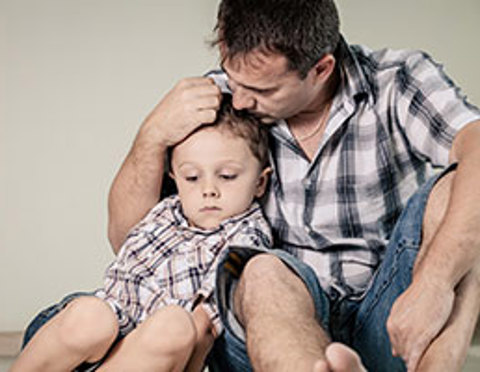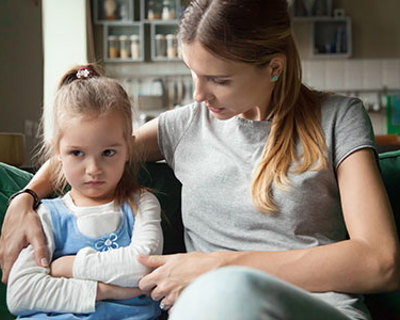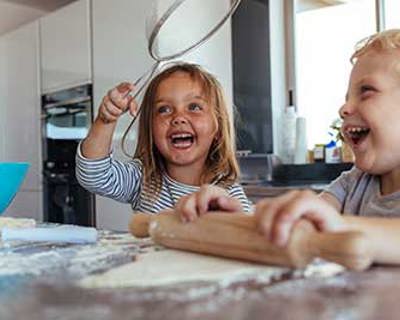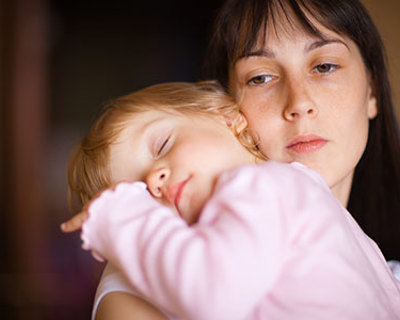Most of us know that stress is bad for us. But understanding a bit more about how we can reduce stress can really help us as parents – and help our children.
Stress is our body’s way of dealing with scary, overwhelming or traumatic situations. The causes can be anything, from the everyday to the uncommon: children’s behaviour, moving house, work, money worries, bereavement, relationships or abuse. What makes us stressed varies from person to person, and we all have limits as to what we can cope with.
The effects of stress
Fight, flight or freeze
When faced with immediate stress, our heart pounds, our breathing quickens, our muscles tense, and we start to sweat. This is sometimes called the ‘fight, flight or freeze’ response.
Human beings have survived as a species because we evolved to react immediately without thinking when threatened. Back in the Ice Age, it was extremely wise to start running if we thought we saw a sabre-toothed tiger. Unfortunately, this instinct can also work against us because we kick into ‘red alert’ at many modern day worries that are less deadly in tooth and claw.
Stress doesn’t always come and go quickly. It is often prolonged, over days, months or even years. When our stress is ongoing, it can have a huge impact on our emotional wellbeing, our mood, motivation, self-esteem, sleep and physical health.
People who have suffered trauma often describe living with a constant sense of anxiety – sometimes called ‘toxic stress’. Watching out for threats everywhere is exhausting and it can be very hard to ‘switch off’ and find a sense of calm and relief from stress.
There is hope though. With the right support, children and adults can recover from the effects of physical and emotional trauma. If you would like to talk this through, or find out more, please get in touch with support line.
Stress and adults’ behaviour
If that wasn’t enough, stress also causes our behaviour to change. We can become more irritable, we can struggle to make decisions and to think straight. Often we end up snapping at those around us and might reach for harmful ways to cope – like drinking too much alcohol or taking comfort in junk food.
Children and stress
When children get scared their instincts will also lead them to ‘fight, flight, or freeze’. Think about a time when your child has done something they know they will be in trouble for: which reaction have they shown? Have they aggressively denied or justified their behaviour? Have they run off hoping to avoid conflict? Or have they simply shut down and stopped responding?
Children’s brains – and their ability to cope with stress – are still developing. When they get stressed, their way of coping is usually played out through changes in their behaviour.

How we reflect our children’s feelings and moods
As social creatures, one of the many fascinating things our brain does is to ‘mirror’ the behaviour of other people. Think about how you might choose different words and act differently depending if you’re speaking to close friends, strangers or colleagues.
When we’re faced with a child who doesn’t yet know how to control their behaviour (because they can’t yet control their emotions) it can be infuriating for us as parents. Kids who feel scared, angry or upset can ‘act out’ with unwanted behaviour – and in turn, parents often reflect the same sort of feelings back at them. (Of course children are unaware of this, and don’t do it on purpose.)
The next time your toddler or teenager is driving you up the wall, it is probably because they are stressed themselves and don’t know how to calm themselves down.
Getting yourself under control first
Being a parent frequently means being tired, feeling overwhelmed and struggling to keep up.
When faced with behaviour which challenges us, often we respond when we’re at the end of our tether, without taking the time to reflect on the best course of action.
Usually – unless they’re about to injure or endanger themselves – dealing with children’s behaviour is not an emergency. It’s just that the primitive parts of our brains are tricked into thinking it is – and that’s why our stress levels go through the roof.
When faced with immediate stress, the most important and effective thing is to come out of the ‘flight, fight or freeze’ mode. Then you can address the situation with a sense of calm. Some call this ‘putting your own oxygen mask on first’. Just like in an aircraft, we’re better able to help others when our own breathing is under control.
It really helps to take a moment to:
- Breathe. Taking deep breaths changes your body and moves it out of ‘fight or flight’ mode into a calmer state. As your heart rate slows and your blood pressure drops, stress and anxiety reduce too – and you’ll feel more able to deal with any situation.
- Be aware of the source of the stress and reflect on what you can do about it.
- If you need to, take a moment alone in another room. If you can’t do that, hide in the toilet for 5 minutes.
- Squeeze fingers and toes and release slowly.
Taking a calm approach to children’s behaviour
Our behaviour pages have lots of tips for ways to think about and address children’s behaviour.
The approaches might not work overnight but with practice you will feel calmer, more in control and able to set effective boundaries – and that makes everyone feel less stressed!
Things to try for your general wellbeing
- Talk it out. It’s true that ‘a problem shared is a problem halved’. Whether it’s family, friends or contacting Parentline, just ‘getting it out’ and getting some perspective can help you feel calmer and reduce stress levels
- Try to create some time for relaxation. Everyone’s different, but it could be enjoying a bath, listening to music, watching TV, reading – anything that relaxes you and isn’t an effort.
- Get some exercise. Walking, running, dancing (even on your own in the kitchen) can have a real and immediate positive effect on your wellbeing.
- Plan some ‘me’ time. Do things you enjoy – that don’t revolve around the children.
- Cut down on those things that you think help but you know don’t – alcohol, cigarettes, caffeine, unhealthy food.
- Have a clear out. Clutter can be another source of stress, and getting on top of it can feel like a relief (and an achievement!)
- Stroke and/or play with a pet.
- Try a meditation app. Many have free versions for simple breathing and relaxation exercises.
- Get into good sleep habits: a consistent routine, no screens before bedtime.



